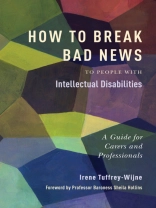This book offers unique and flexible guidelines that can be used by practitioners to ease the process of breaking bad news to people with intellectual disabilities. The guidelines, which are adaptable to individual communication ability and level of understanding, address the many complex needs of people with intellectual disabilities who can find understanding and accepting news that has a negative impact on their life a very difficult task. In the book, Irene Tuffrey-Wijne covers a range of different types of bad news, from bereavement and illness to more minor issues such as a change of accommodation, and offers highly practical and effective tips that will help carers and practitioners ensure that bad news is relayed as sensitively and successfully as possible.
An easy-to-use and comprehensive guide, this book will be an invaluable resource of information for carers, health professionals such as doctors and nurses as well as families of people with intellectual disabilities.
विषयसूची
Foreword by Professor Baroness Sheila Hollins. Section 1: Background. 1. Introduction. 2. Intellectual Disabilities. 3. What Is Bad News? 4. Breaking Bad News: Knowledge, Skill and Guidelines So Far. 5. Why We Need New Guidelines for Breaking Bad News. Section 2: Guidelines for Breaking Bad News. 6. Overview of the Guidelines. 7. Component 1: Building a Foundation of Knowledge. 8. Component 2: Understanding. 9. Component 3: People. 10. Component 4: Support. Section 3: Using the Guidelines. 11. How Can We Break the Knowledge Down into Chunks? 12. When Can We Start Building Knowledge? 13. Who Can Give Chunks of Knowledge? 14. Who Should Be Told? 15. How Much Can Someone with Intellectual Disabilities Understand? 16. Communicating with People with Intellectual Disabilities. 17. Can Someone Be Harmed By Receiving Too Much Information? 18. Sudden Bad News. 19. What If People Disagree about Breaking Bad News? 20. Some Further Advice. Section 4: Examples of the Model in Practice. 21. Introduction to the Examples. 22. Example A: Jeremy and Christine have cancer. 23. Example B: Ahmed and Carol have to move. 24. Example C: Moira, Ben and Isabel’s friend has dementia. Section 5: Appendices. Appendix 1: Flow Chart: A One-Page Overview. Appendix 2: Ten Guiding Questions. Appendix 3: The Mental Capacity Act. Appendix 4: Resources. References.
लेखक के बारे में
Irene Tuffrey-Wijne qualified as a nurse in Amsterdam, and moved to the UK in 1985. She holds a first degree in Palliative Care Nursing and completed a Ph D in the palliative care of people with intellectual disabilities at Maastricht University, The Netherlands. Irene has extensive clinical experience in the fields of both intellectual disabilities (as a support worker and home manager) and palliative care (as a clinical nurse specialist at a hospice). She now works as a Senior Research Fellow at St George’s University of London, leading a programme of research aimed at improving health care and end of life care for people with learning disabilities. She is chair of the Palliative Care for people with Learning Disabilities Network. She is also author of Living with Learning Disabilities, Dying with Cancer and lives in London with her husband and three children.












